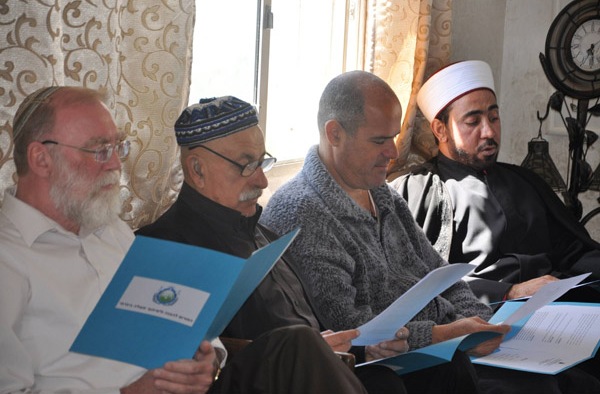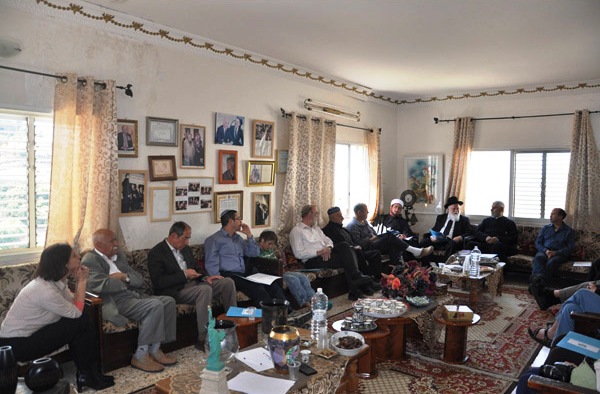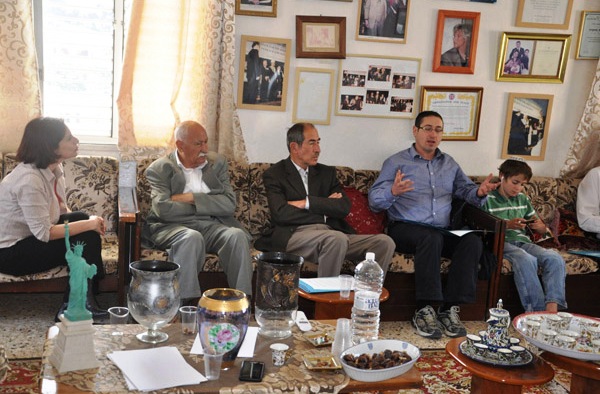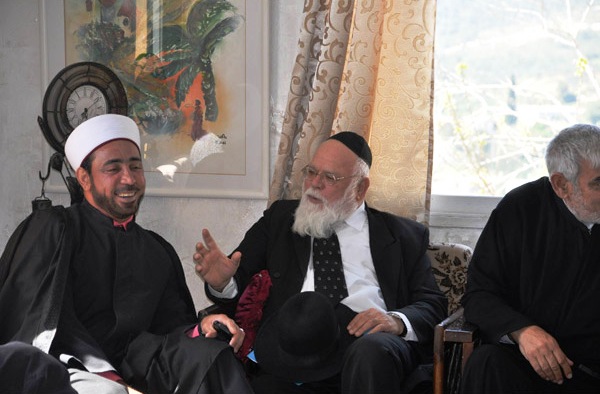![]()
The Words of the Kamar Family
|
|
The Words of the Kamar Family |

Daliat El-Carmel, Israel -- The fifth inter-religious forum organized by UPF-Israel brought together 21 academic and religious leaders as well as social activists on March 21. Host Sheik Ali Birani invited the forum members to enjoy the warm hospitality at his home, situated at the largest Druze town in Israel, Daliat El Carmel near Haifa. The theme chosen for deliberation was: "The principle of living for the sake of others."
Sheik Samir Aasi opened by reading verses from the Holy Qur'an to the unique melody of the Muslim prayer: "Not one of you is a believer until he loves for his brother what he loves for himself" (Forty Hadith of an Nawawi: hadith 13). Dr. Or Margalit followed with a liturgical reading from the Bible in the Jewish prayer style: "Thou shalt love thy neighbor as thyself: I am the Lord" (Leviticus 19:18).
Sheik Samich Natur explained about the principle of loving the other in the Druze religion and gave an example of practicing this principle from history – when the Druze Amir Facher el-Din appointed a Jew to be his Minister of Finance. Another contemporary example given was from the Druze community in Syria. Due to the current civil war situation, tens of thousands of non-Druze refugees are being taken care of and are protected by the Druze people.

Rev. Abu Hatum read verses from the New Testament in Arabic: "'Teacher, which commandment in the law is the greatest?' He said to him, 'You shall love the Lord your God with all your heart, and with all your soul, and with all your mind.' This is the greatest and first commandment. And a second is like it: 'You shall love your neighbour as yourself.' On these two commandments hang all the law and the prophets" (Mathew 22:36-40).
Mrs. Miri Kamar, Secretary General of UPF-Israel, read a paragraph from a speech of the founder of UPF, Rev. Sun Myung Moon: "Then what is true love? Its essence is to give, to live for the sake of others and for the sake of the whole. True love gives, forgets that it has given, and continues to give without ceasing. True love gives joyfully. We find it in the joyful and loving heart of a mother who cradles her baby in her arms and nurses it at her breast."
After reading the various texts, Dr. Nurit Hirschfeld noted that all religions teach the principle of loving the other; however, as individuals we find ourselves struggling to apply it in our daily lives. She went on to ask what acts or deeds members of the forum could do in order to realize the vision of living for the sake of others.
Rev. Abu Hatum said that the greatest commandment is love. As it is written in the New Testament: we should love each other in the same way that God loves human beings: loving without any selfish interests. Where there is love there is God, and in front of God all human beings are equal.

Mrs. Judi Hirschfeld, an organizational consultant, said similar things: usually in an organization, love is experienced through the hierarchy and given benefits. But in front of God everyone is equal; thus, love is equal.
Rabbi Itzhak Bar-Dea responded to the biblical verse, "Thou shalt love thy neighbor as thyself: I am the Lord," pointing the connection between God and loving the neighbor. Believing in God is the condition of loving the neighbor. Thus God is helping us to love our enemies.
Professor Efraim Meir, head of the Jewish philosophy department at Bar Ilan University, said that we should be realistic and acknowledge also the problems in our religions. Religions have the power to build as well as the power to destroy. "To love the neighbor is to love God. That is where the sublime exists. To pray deeply and feel holy but be rude to your neighbor is wrong. In a gatherings such as the one we are having now, we respect God. Fearing God is respecting human beings," he concluded.
Dr. Or Margalit related to the Islamic verse in which one should not be called a believer until he loves his brother as himself, and connected it to the Jewish verse "I am the lord." He suggested a new way to define religion and belief: to love one another is to be a believer. And if this is the essence of the religions, he suggested that the enormous power that exists in religion could be renewed: not a power that divides peoples, but a power of loving and uniting.

Mr. Kobi Nehushtan, a kabbalah scholar and homeopathic doctor, said that love is the essence of human existence. Love is the alpha and the omega. Love is the healthy situation, while hate is a disease that needs to be cured. For him the main question is whether one's mouth and one's heart are equal. "Are we just talking about high values?" he asked, "or are we living according to those values?"
To strengthen Kobi's argument about love as the essence of our existence, Professor Yoram Hirschfeld from Tel Aviv University said that a baby loves naturally, but it takes much longer to learns to hate.
The meeting concluded with sharing some impressions from UPF's World Summit recently held in Korea, in which Rabbi Bar-Dea, Sheik Samir Aasi, and Rev. Abu Hatuom took part. The three religious leaders agreed that it was a moving experience filled with hope to be among religious leaders from all around the world. They brought with them the spirit of friendship and mutual respect for one another. The warm and deep friendship they displayed inspired the other participants with hope that indeed peace among religions can be achieved.
Rabbi Bar-Dea said that everyone who speaks about peace -- whether it is in a big forum or in a small forum -- should know that no word is lost. If the word went out to the world, it will be carried on by the spirit and will make the change, because God is listening and responding to our words and deeds.
Mr. Yaron Sadot, who expressed his doubts at the beginning of the meeting about the possible impact of a small group of people to make a change, said that the rabbi's words gave him new hope and made him realize that indeed we matter, and that a change to the better can take place!